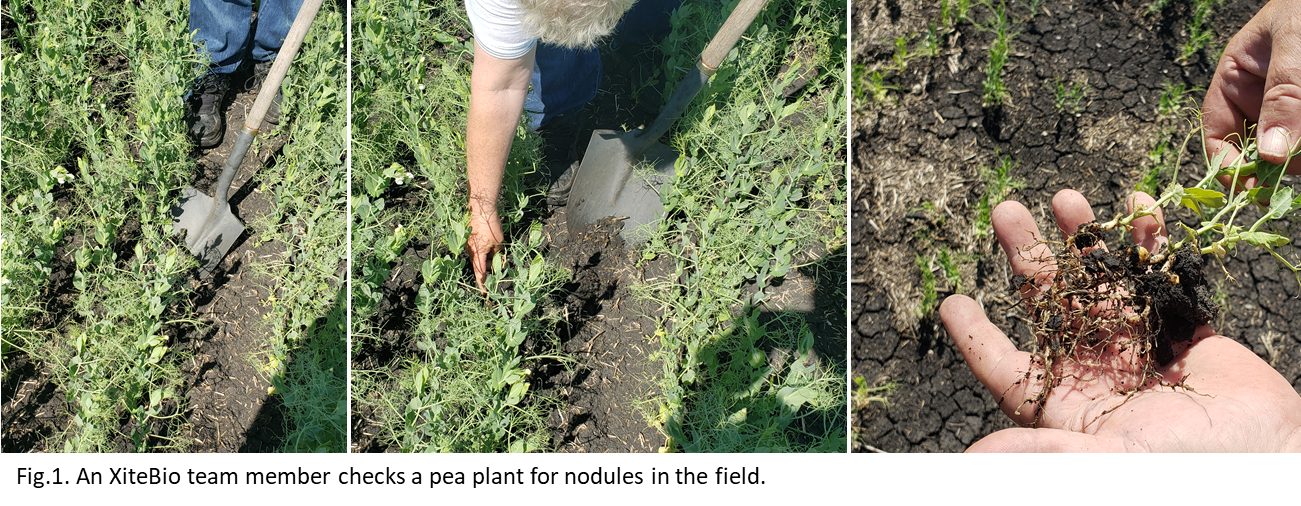Plant 2021 is over and done with for legume growers across Canada and the USA, with many crops just recently starting to emerge. You’ve put the seed in the ground, you’ve applied your crop inputs, now all you can do is wait. But when it comes to root nodules and nitrogen (N)-fixation, what exactly are you waiting for? How do you know when you are getting results from your inoculant application? In this week’s edition of Growing Possibilities, we will be taking you through the steps of checking your legume crop for successful root nodulation and what you need to look for in your crop this season.
After planting it will take a few weeks for nodules to develop and start fixing N, so wait 4-6 weeks after putting seed in the ground before checking nodulation. To see if your plant roots are nodulated, start by carefully digging out a test plant, leaving the surrounding soil and rhizosphere intact. Gently break away the soil around the roots of the plant and look for nodules on the roots. Bringing along a bucket of water to dip your plant into is the easiest way to do this without accidentally breaking away any nodules. If you applied your inoculant as a seed treatment, nodules will likely be more common at the crown of your root system. If you applied your inoculant in-furrow, nodules may be more prominent on lateral roots.
After locating some nodules on your plant’s roots remove one or two and slice them open to reveal the color inside. If the inside of the nodule is a pinkish red color, then your nodules are active and N fixation is occurring. If your nodules are a pale white color, they are likely still young and not yet fixing N. If your nodules are a grey/green color on the inside, this indicates they are no longer active and have ceased N fixation.
If you check your plant roots and see a lack of effective nodules there could be a few reasons why.
If your soil pH is either too low (<5.5) or too high (>8) then the bacteria in your inoculant can be harmed and become ineffective or even die (1, 2). Soil Compaction or soil flooding can prevent airborne N from entering the soil, which can effect nodule formation and effectiveness.
Although most rhizobial inoculants work in a similar way, each legume crop utilises a very specific species of N-fixing bacteria to form nodules. If you use an inoculant that does not contain the specific type of bacteria required for your crop, then it will not form a symbiosis with your plants’ roots. Always make sure you are using the bacterium that is specific to your crop. For soybeans, this is Bradyrhizobium japonicum. For peas, lentils & faba beans, this is Rhizobium leguminosarum.
Sometimes, even if you applied the correct bacteria and followed all instructions you will not see nodulation. A common culprit in this scenario of non-nodulation is the presence of high levels of N in the soil. If you have more than approximately 50 lb/acre of N in your soil already, then your crop will use this N source before spending the energy to create root nodules (3).
Assessing nodulation on your legume crops can be a pretty straightforward process, but if you have any questions related to nodulation or inoculant performance, feel free to contact your local XiteBio sales rep. They are always happy to take your questions about inoculants & biologicals, and to educate growers on the power of helpful soil microbes.
To see more frequently asked questions about root nodules and other inoculant & biological topics, Click Here.
References:
1) Staton M. 2014. Identifying and responding to soybean inoculation failures. Michigan State University. Published 4 Feb 2014.
2) Conley S. 2015. Non-nodulating soybean questions. Agri-View Briefs. Published 23 July 2015. Available online at: http:// www.agriview.com/briefs/crop/non-nodulating-soybean-questions/article_9b2f79e6-dd9d-5277-b414-4e80a63fd84f.html.
3) https://www.saskatchewan.ca/business/agriculture-natural-resources-and-industry/agribusiness-farmers-and-ranchers/crops-and-irrigation/soils-fertility-and-nutrients/inoculation-of-pulse-crops


